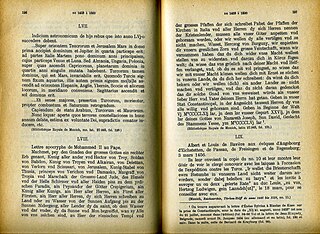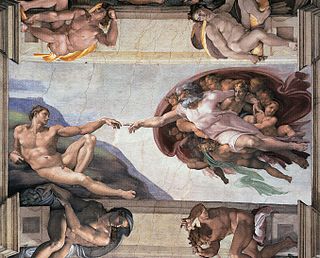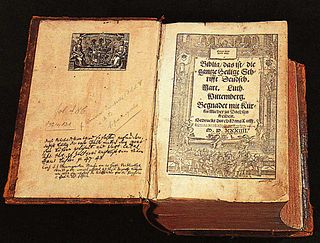
Apocrypha are written works, often of unknown authorship or doubtful origin. In Christianity, the word apocryphal (ἀπόκρυφος) was first applied to writings which were to be read privately rather than in the public context of church services -- edifying Christian works which were not considered canonical Scripture. In the wake of the Protestant Reformation, the word apocrypha came to mean "false, spurious, bad, or heretical".

The Bible is a collection of religious texts or scriptures that are held to be sacred in Christianity, Judaism, Samaritanism, and many other religions. The Bible is an anthology – a compilation of texts of a variety of forms – originally written in Hebrew, Aramaic, and Koine Greek. These texts include instructions, stories, poetry, and prophecies, among other genres. The collection of materials that are accepted as part of the Bible by a particular religious tradition or community is called a biblical canon. Believers in the Bible generally consider it to be a product of divine inspiration, but the way they understand what that means and interpret the text can vary.

The Book of Nehemiah in the Hebrew Bible, largely takes the form of a first-person memoir concerning the rebuilding of the walls of Jerusalem after the Babylonian exile by Nehemiah, a Jew who is a high official at the Persian court, and the dedication of the city and its people to God's laws (Torah). Since the 16th century, it has generally been treated as a separate book within the Bible. Before that date, it had been included in the Book of Ezra; but in Latin Christian Bibles from the 13th century onwards, the Vulgate Book of Ezra was divided into two texts, called respectively the First and Second books of Ezra; a separation which became canonised with the first printed bibles in Hebrew and Latin. Mid 16th century Reformed Protestant Bible translations produced in Geneva were the first to introduce the name 'Book of Nehemiah' for the text formerly called the 'Second Book of Ezra'.

The deuterocanonical books are books and passages considered by the Catholic Church, the Eastern Orthodox Church, the Oriental Orthodox Churches, and the Assyrian Church of the East to be canonical books of the Old Testament, but which Protestant denominations regard as apocrypha. They date from 300 BC to 100 AD, mostly from 200 BC to 70 AD, before the definite separation of the Christian church from Judaism. While the New Testament never directly quotes from or names these books, the apostles most frequently used and quoted the Septuagint, which includes them. Some say there is a correspondence of thought, and others see texts from these books being paraphrased, referred, or alluded to many times in the New Testament, depending in large measure on what is counted as a reference.

The Old Testament is the first division of the Christian biblical canon, which is based primarily upon the 24 books of the Hebrew Bible or Tanakh, a collection of ancient religious Hebrew and occasionally Aramaic writings by the Israelites. The second division of Christian Bibles is the New Testament, written in the Koine Greek language.

The Hebrew Bible or Tanakh, also known in Hebrew as Miqra, is the canonical collection of Hebrew scriptures, including the Torah, the Nevi'im, and the Ketuvim. Different branches of Judaism and Samaritanism have maintained different versions of the canon, including the 3rd-century Septuagint text used in Second Temple Judaism, the Syriac Peshitta, the Samaritan Pentateuch, the Dead Sea Scrolls, and most recently the 10th-century medieval Masoretic Text compiled by the Masoretes, currently used in Rabbinic Judaism. The terms "Hebrew Bible" or "Hebrew Canon" are frequently confused with the Masoretic Text, however, this is a medieval version and one of several texts considered authoritative by different types of Judaism throughout history. The current edition of the Masoretic Text is mostly in Biblical Hebrew, with a few passages in Biblical Aramaic.

Nevi'im is the second major division of the Hebrew Bible, lying between the Torah (instruction) and Ketuvim (writings). The Nevi'im are divided into two groups. The Former Prophets consists of the narrative books of Joshua, Judges, Samuel and Kings; while the Latter Prophets include the books of Isaiah, Jeremiah, Ezekiel, and the Twelve Minor Prophets.

The major prophets is a grouping of books in the Christian Old Testament that does not occur in the Hebrew Bible. All of these books are traditionally regarded as authored by a prophet such as Jeremiah, Isaiah, Daniel, and Ezekiel. The term "major" has nothing to do with the achievement or importance of the prophets, rather the length of the books. In comparison to the books of the Twelve Minor Prophets, whose books are short and grouped together into one single book in the Hebrew Bible, these books are much longer.
The intertestamental period (Protestant) or deuterocanonical period is the period of time between the events of the protocanonical books and the New Testament. Traditionally, it is considered to cover roughly four hundred years, spanning the ministry of Malachi to the appearance of John the Baptist in the early 1st century AD. It is roughly contiguous with the Second Temple period and encompasses the age of Hellenistic Judaism.

The prophetic books are a division of the Christian Bible, grouping 18 books or 17 books in the Old Testament. In terms of the Tanakh, it includes the Latter Prophets from the Nevi'im, with the addition of Lamentions and Daniel, both of which are included among the books of the Hebrew Ketuvim.

The biblical apocrypha denotes the collection of apocryphal ancient books thought to have been written some time between 200 BC and AD 400. The Roman Catholic, Eastern Orthodox and Oriental Orthodox churches include some or all of the same texts within the body of their version of the Old Testament, terming them deuterocanonical books. Traditional 80-book Protestant Bibles include fourteen books in an intertestamental section between the Old Testament and New Testament called the Apocrypha, deeming these useful for instruction, but non-canonical. To this date, the Apocrypha are "included in the lectionaries of Anglican and Lutheran Churches". Anabaptists use the Luther Bible, which contains the Apocrypha as intertestamental books; Amish wedding ceremonies include "the retelling of the marriage of Tobias and Sarah in the Apocrypha". Moreover, the Revised Common Lectionary, in use by most mainline Protestants including Methodists and Moravians, lists readings from the Apocrypha in the liturgical calendar, although alternate Old Testament scripture lessons are provided.
The Synod of Hippo refers to the synod of 393 which was hosted in Hippo Regius in northern Africa during the early Christian Church. Additional synods were held in 394, 397, 401 and 426. Some were attended by Augustine of Hippo.

The chronology of the Bible is an elaborate system of lifespans, 'generations', and other means by which the Masoretic Hebrew Bible measures the passage of events from the creation to around 164 BCE. It was theological in intent, not historical in the modern sense, and functions as an implied prophecy whose key lies in the identification of the final event. The passage of time is measured initially by adding the ages of the Patriarchs at the birth of their firstborn sons, later through express statements, and later still by the synchronised reigns of the kings of Israel and Judah.

The Old Testament is the first section of the two-part Christian biblical canon; the second section is the New Testament. The Old Testament includes the books of the Hebrew Bible (Tanakh) or protocanon, and in various Christian denominations also includes deuterocanonical books. Orthodox Christians, Catholics and Protestants use different canons, which differ with respect to the texts that are included in the Old Testament.

There is no scholarly consensus as to when the Hebrew Bible canon was fixed. Some scholars argue that it was fixed by the Hasmonean dynasty, while others argue it was not fixed until the second century CE or even later.

The term Catholic Bible can be understood in two ways. More generally, it can refer to a Christian Bible that includes the whole 73-book canon recognized by the Catholic Church, including some of the deuterocanonical books of the Old Testament which are in the Greek Septuagint collection, but which are not present in the Hebrew Masoretic Text collection. More specifically, the term can refer to a version or translation of the Bible which is published with the Catholic Church's approval, in accordance with Catholic canon law.

A biblical canon is a set of texts which a particular Jewish or Christian religious community regards as part of the Bible.

A Protestant Bible is a Christian Bible whose translation or revision was produced by Protestant Christians. Such Bibles comprise 39 books of the Old Testament and 27 books of the New Testament, for a total of 66 books. Some Protestants use Bibles which also include 14 additional books in a section known as the Apocrypha bringing the total to 80 books. This is often contrasted with the 73 books of the Catholic Bible, which includes seven deuterocanonical books as a part of the Old Testament. The division between protocanonical and deuterocanonical books is not accepted by all Protestants who simply view books as being canonical or not and therefore classify books found in the Deuterocanon, along with other books, as part of the Apocrypha. Sometimes the term "Protestant Bible" is simply used as a shorthand for a bible which contains only the 66 books of the Old and New Testaments.
The earliest known precursor to Hebrew, an inscription in the Paleo-Hebrew alphabet, is the Khirbet Qeiyafa Inscription, if it can be considered Hebrew at that early a stage.

The Poetic Books, also called the Sapiential Books, are a division of the Christian Bible grouping 5 or 7 books in the Old Testament. The term "Sapiential Books" refers to the same set, although not all the Psalms are usually regarded as belonging to the Wisdom tradition.









